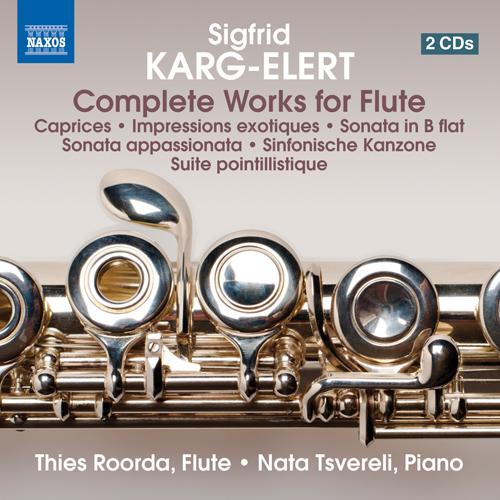KARG-ELERT, S.: Flute Works (Complete) (Roorda, Tsvereli)
Karg-Elert occupies a remarkable niche in the history of German music. He is best known for his compositions for organ and harmonium but this first recording of his complete works for flute, reveals a completely individual voice. The ground-breaking Sonata in B flat, Op. 121 stretches virtuosity to the instrument’s limits, the Suite pointillistique is exquisitely colourful and the Sonata appassionata romantically expressive. Each work, not least the challenging Caprices, reflects Karg-Elert’s kaleidoscopic imagination, and represents a significant body of music for the flute in the twentieth century.
Tracklist
Tsvereli, Nata (piano)
Tsvereli, Nata (piano)
Tsvereli, Nata (piano)
Tsvereli, Nata (piano)
Tsvereli, Nata (piano)
Tsvereli, Nata (piano)
Tsvereli, Nata (piano)
Tsvereli, Nata (piano)
Tsvereli, Nata (piano)
Tsvereli, Nata (piano)
Tsvereli, Nata (piano)
Tsvereli, Nata (piano)
Tsvereli, Nata (piano)
Tsvereli, Nata (piano)
Tsvereli, Nata (piano)
Tsvereli, Nata (piano)
Tsvereli, Nata (piano)

Thies Roorda studied at the Royal Conservatory, The Hague with Paul Verhey and in the United States with the renowned Geoffrey Gilbert. After a long standing orchestral career with the Netherlands Radio Philharmonic Orchestra, he now dedicates himself to specific periods of the flute repertoire that are of particular interest to him. His Naxos recordings, such as the complete works for flute by Karg-Elert and works by Widor, have received critical acclaim.
Several composers have dedicated works to Roorda, including Jean Françaix. Of the latter, he recorded the Divertimento for Flute and Piano accompanied by the composer himself. In addition, he has also recorded works by, among others, Giacinto Scelsi and Rudolf Escher. Roorda is a passionate teacher, recognised for how he addresses the expressive qualities of the flute and his ‘Blow How’ approach. He is professor of flute at the Royal Conservatory, The Hague and teaches privately in his studio in Amsterdam. He has taught masterclasses all over Europe, Australia and Canada.

Nata Tsvereli had her first piano lessons at the age of eight. Her professional studies began in 1994 at the Tbilisi State Conservatoire with Nodar Gabunia. One year later she won first prize at the Georgian Republic Piano Competition in Tbilisi. She received the prestigious Shevardnadze scholarship in 1998. In the same year she won first prize at both the London International Piano Competition and the International Maria Yudina Competition in St Petersburg subsequently making her début with the St Petersburg Philharmonic Orchestra performing Chopin’s Second and Rachmaninov’s Third Piano Concerto in the Philharmonia Hall. In 2002 she started studies for her master’s degree with Jan Wijn at the Amsterdam Conservatoire graduating in 2004 with honours. A year later she played Leonard Bernstein’s The Age of Anxiety with the Noord-Nederlands Orkest conducted by Michel Tabachnik. In the same year she won the ING Bank Audition Award. Nata Tsvereli has performed often in Georgia, the Netherlands, England, Russia and Germany. In the 2007 series of Het Debuut (The Debut) she gave ten solo recitals in major concert halls throughout the Netherlands. In addition to her solo performances she forms a piano duo with pianist Paul Komen. She is professor of piano at the Prince Claus Conservatoire in Groningen.
A chorister at the Johanniskirche in Leipzig, Sigfrid Karg had his earlier musical education there, before training to become a teacher. His father’s death in 1889 had brought financial difficulties, which led him, as an adolescent, to support himself as a freelance musician. In 1896 he entered Leipzig Conservatory. His earlier career suggested the possibility of earning a living as a solo pianist, but the encouragement of Grieg led him to further musical study and to composition. Rejecting the modernist musical tendencies that had interested him for a time, he wrote relatively little after the 1914–18 war.
Music for Organ and Harmonium
Karg-Elert, the second part of his name taken from that of his mother, is principally known for the many works that he wrote for the improved four-rank harmonium and which he performed on that instrument. Some of these formed the basis of his organ music and make not inconsiderable technical demands on a performer. Although he wrote a quantity of instrumental and vocal music, his name is today chiefly remembered by organists.































